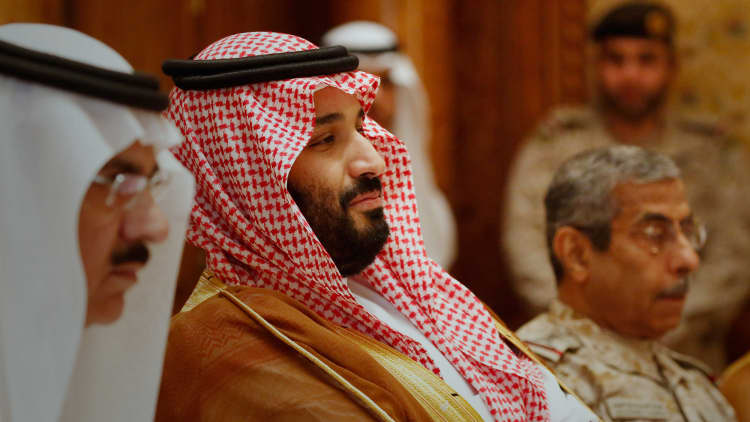
The mass weekend arrests by Saudi Arabia could be due to both the stated purpose of cracking down on corruption and a power grab by the kingdom's young, reform-minded crown prince who may soon take the throne, said Robert Jordan, former U.S. ambassador to the kingdom.
On Saturday, 11 princes, including well-known billionaire investor Alwaleed bin Talal, and four ministers, including the one in charge of the National Guard, were arrested, according to various reports, along with a number of former ministers.
Two weeks ago, Alwaleed, who spoke to CNBC in an extensive interview from his apartment in Riyadh, talked about the massive upcoming Saudi Aramco IPO, his vast investments in shares of U.S. corporations and what he called "a lot of good policies" of President Donald Trump.
"This would be like arresting Warren Buffett or Bill Gates in the United States," Jordan told CNBC's "Squawk Box" on Monday.
"We've got to figure out what the basis of these charges could be" against the Saudi royals and high-ranking government ministers and former officials, he urged. "The Saudis are going to have to be transparent about what happens. We're going to have to understand why it is that these leaders have be incarcerated."
The arrests happened hours after King Salman created an anti-corruption committee chaired by his 32-year-old son, Crown Prince Mohammad Bin Salman. MBS, as the crown prince is known, could become king later this year or in early 2018 when his 81-year-old father abdicates the throne.
Jordan, the top U.S. diplomat to Saudi Arabia during the presidency of George W. Bush, said the kingdom has long had a problem with corruption, so the weekend actions could be partly a crackdown. But he also said the moves could be MBS consolidating his power.
"I think both conditions could actually be true. It's a huge story either way it goes," argued Jordan, currently a political science professor at Southern Methodist University and a longtime partner in the international law firm Baker Botts, where he had headed the Mideast practice in Dubai.
"Certainly Saudi Arabia has had a corruption problem for many years. I think the population, especially, has been very unhappy with princes coming in and grabbing business deals, with public funds going to flood control projects that never seem to get built" for example, Jordan said.
However, he added, "I would also say it's a classical power grab move sometimes to arrest your rivals, your potential rivals under the pretext of corruption."
The crown prince is also currently trying to diversify the Saudi economy, traditionally tied closely to oil revenues, through a plan called "Vision 2030."


